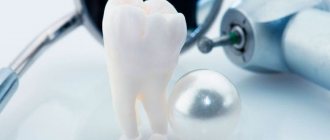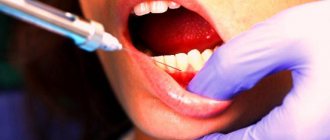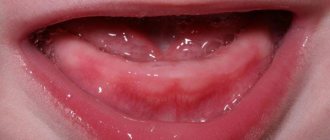Bitterness in the mouth may indicate problems with the digestive system. Severe or persistent bitterness in the mouth is a reason to consult a doctor.
From time to time you may experience an unpleasant bitter taste in your mouth. As a rule, this is due to a sudden release of bile into the gastrointestinal tract. In this case, some bile may enter the esophagus and cause a bitter sensation in the mouth.
. Often a bitter taste in the mouth is felt in the morning, since bile can enter the stomach during sleep (especially if you sleep on your left side and dinner included fatty foods).
Bile is a secretion produced by the liver and is necessary for digesting food. The bile duct carries bile from the liver to the gallbladder, which acts as a storage reservoir. During the active digestive phase, bile from the gallbladder enters the duodenum. Some substances have choleretic properties, that is, they increase the production of bile. Eating foods with choleretic properties (for example, pine nuts) can provoke a sharp increase in the flow of bile into the intestines and, as a result, the appearance of bitterness in the mouth. Some medications have the same effect - both medical preparations and traditional medicine (St. John's wort, sea buckthorn oil, etc.).
However, bitterness in the mouth should not be ignored
. Its appearance indicates that not everything is in order with the digestive system. For example, a bitter taste may appear after eating fatty (heavy) foods. Fatty foods stimulate bile secretion. Normally, the secreted bile should not enter the stomach and esophagus, but should be released exactly as much as is necessary for the digestive process in the intestines. The appearance of bitterness indicates that this is not the case. And we need to figure out what caused this. If bitterness in the mouth occurs frequently or persists for a long time, then it is better not to delay a visit to the doctor.
Causes of bitterness in the mouth
Bitterness in the mouth can be a symptom of various diseases.
Most often it is caused by diseases of the organs responsible for the production and movement of bile in the body, such as chronic cholecystitis
(inflammation of the gallbladder),
cholelithiasis
(in this case, the formation of stones interferes with the proper outflow of bile),
biliary dyskinesia
(impaired motility). Sometimes patients who previously had a bitter taste in the mouth due to cholelithiasis or inflammation of the gallbladder, and who had a cholecystectomy (surgery to remove the gallbladder), are surprised by the return of the symptom. But a bitter taste in the mouth can occur even in the absence of a gallbladder, because bile is still produced and can enter the stomach, and from it into the esophagus. If a person has had their gallbladder removed but has not changed their eating habits, the return of digestive problems and a bitter taste in the mouth is very likely
Bitterness in the mouth can occur with various disorders of the digestive system, for example with chronic gastritis
or
chronic pancreatitis
Liver diseases can lead to changes in the composition of saliva, which may also result in a bitter taste in the mouth.
Another group of reasons for the feeling of bitterness in the mouth is diseases of the oral cavity (stomatitis, inflammation of the tongue). A bitter taste can also be a reaction to dentures if they were chosen incorrectly (the individual intolerance of the material from which they are made was not taken into account).
Sometimes bitterness in the mouth is caused by other reasons: toxicosis (in pregnant women), acute poisoning, cancer.
How to cope with heartburn and indigestion during pregnancy?
Independent methods of treatment
As already mentioned, most pregnant women experience heartburn and indigestion, but there are simple and useful tips that will help you experience these unpleasant sensations less often:
Try to give up bad habits
- Stop smoking and drinking alcohol - both of these can only contribute to the appearance of heartburn and stomach discomfort, not to mention the fact that this is simply contraindicated during pregnancy.
Eat right
- Proper nutrition is an integral part of pregnancy. It is very important to maintain a balance of proteins, high-starch foods, vegetables and fruits. However, the best way to relieve heartburn is to avoid trigger foods. Spicy and fatty foods, caffeine, chocolate and tomatoes are the most common foods that most often cause heartburn.
Change your eating habits
- It is recommended to divide your daily diet into small portions and eat more often throughout the day. This way of eating will bring more benefits than three large meals. This will prevent overfilling and can ultimately prevent stomach acid from getting into your esophagus.
- If you experience heartburn and indigestion at night, you may be a late-night eater. If this is true, then gastric juice will continue to be produced even after you go to bed. To avoid this, it is better to eat 2-3 hours before bed: this time is just enough to digest the food.
Pregnancy doesn't mean you have to eat for two. Excess weight can cause you discomfort in the later stages. For women whose weight was normal before pregnancy, it is recommended to gain no more than 10-14 kg.3
Get plenty of rest
- Pregnancy is a blessing for expectant parents and the whole family, but sometimes you have to be nervous. Since stress can also cause heartburn and indigestion, try to regularly set aside time for yourself to relax. This way you can reduce the likelihood of the negative effects of stress.
Think about the body position you are in
- After eating, try to stand or sit for a while, do not lie down immediately after eating. Also try to avoid strenuous activity after eating, especially if it involves bending.
- Try to avoid putting additional pressure on the waist and abdominal area. In particular, do not wear compression belts. Don't forget about this when children or pets ask to sit on your lap.
- Get used to the correct sleeping position, which will allow you to avoid unpleasant sensations while you sleep. When you lie on your back, stomach acid is more likely to enter your esophagus. Some people find that raising the head of the bed can also help. Always pay attention to the position of your body - this is important both during pregnancy and in any other condition!
Treatment with medications
During pregnancy, expectant mothers are wary of taking medications. This is completely justified; no one wants to harm their unborn baby. However, there are medications that you can take during pregnancy without worrying about the baby's health. Despite this, always read the instructions before using a new drug and pay attention to special advice and side effects of drugs.
Antacids
Such drugs usually contain calcium carbonate, magnesium carbonate or aluminum hydroxide; they neutralize stomach acidity. They are used to treat mild attacks of heartburn and indigestion and are available in several forms, including liquid and chewable tablets.
alginates
"Gaviscon® Double Action" is a well-known drug related to alginates and has a neutralizing effect on excess gastric acid. Sodium alginate in its composition forms a protective barrier that prevents the contents of the stomach (including gastric juice) from entering the esophagus, due to which discomfort and pain disappear.
In addition, Gaviscon® Double Action contains calcium carbonate, which quickly neutralizes excess stomach acid. The result will be a reduction in discomfort in the stomach area. Gaviscon® provides long-term relief from heartburn and indigestion4 and has a longer-lasting effect on acid reflux than simple antacids.5,6
Gaviscon® Double Action can be used during pregnancy. The possibility of its use is explained by the fact that the drug is not absorbed into the blood.
If you are taking antacids or alginates (eg Gaviscon® Double Action), remember not to exceed the recommended dose. Follow the instructions carefully.
Additional symptoms of bitterness in the mouth
Bitterness in the mouth may be accompanied by additional symptoms. If heaviness or pain is felt in the right side, this may indicate liver or gallbladder disease. If bitterness in the mouth is accompanied by nausea, heartburn, and belching, then the cause may be stomach diseases. If the cause is diseases of the oral cavity, then the feeling of bitterness may be accompanied by bad breath.
Diagnostics
In order to determine the cause of sour taste in men , it is necessary to undergo a comprehensive examination, which will exclude or confirm certain diseases. Comprehensive diagnostics includes the following activities:
- esophagogastroduodenoscopy (most informative for diagnosing gastric ulcers ;
- gastric pH-metry;
- ultrasound examination of the abdominal organs, including the liver and gallbladder;
- ultrasound examination of the pancreas;
- biochemical blood test, including liver tests and assessment of pancreatic enzyme levels;
- general clinical blood test;
- assessing blood glucose levels;
- consultation with a neurologist, endocrinologist, gastroenterologist, hepatologist;
- analysis for glycosylated hemoglobin.
What should you not eat or drink?
There is no place for harmful foods in a properly composed diet for a pregnant woman. Throughout the perinatal period, the following are blacklisted:
• fast food; • flavored snacks; • hot sauces; • smoked meats; • products containing many preservatives; • alcohol.
The expectant mother is advised to limit the consumption of sausages, confectionery products, and sweet pastries. You also need to be careful with citrus fruits, strawberries, mushrooms, and coffee. It is advisable to exclude packaged juices, bottled tea, sweet cocktails, and soda from the grocery basket.
Dieting is difficult, but necessary. This will help minimize the harmful effects on the fetus, maintain pregnancy, improve well-being, avoid weight gain, and the development of gestational complications - preeclampsia, pyelonephritis, diabetes.
Diet rules
The principles of constructing a diet during the perinatal period differ little from the general rules of healthy eating. After all, pregnancy is not a disease.
Organizing a proper diet includes:
• Refusal of junk food and drinks. Carcinogens, preservatives, flavorings, flavor enhancers, and alcohol increase perinatal risks. • Control of KBJU. Helps maintain stable weight and nutritional balance. • Daily consumption of healthy foods containing protein, minerals, vitamins. These substances are necessary for the development of the fetus and the health of the mother. • Compliance with the drinking regime (1.5-2 liters per day). Clean water ensures normal blood flow, regulates the functioning of the urinary organs and intestines. • Small meals: 5-6 times a day with an interval of 3-4 hours. This schedule helps you not to overeat and properly absorb nutrients. • Cooking foods in healthy ways. Cooking dishes by boiling, stewing, and baking allows you to reduce calories, reduce the load on the digestive organs, and get rid of nausea and heartburn. • Limiting salt. A slight salt deficiency during pregnancy reduces the load on the kidneys and heart muscle and prevents the appearance of swelling. • Limit on fast carbohydrates. The body gets glucose from sweet foods, the main source of energy, so you can’t give them up completely. But excessive passion for confectionery products leads to metabolic failure, obesity, and the development of insulin resistance. • Keeping a food diary.
The diet for pregnant women has its bonuses. A woman will master healthy menu recipes, get used to eating right, and easily get into shape after giving birth. Of course, you shouldn’t make a cult out of food, forgetting about your own comfort and appearance. Special underwear for pregnant women will help you feel confident, and hypoallergenic products will take care of the beauty of your skin - stretch mark creams, gels, balms. Today, all products for pregnant women and nursing mothers can be ordered from an online pharmacy with home delivery.
Second trimester - needs increase
By about 14-15 weeks, the woman’s well-being returns to normal - toxicosis goes away, physical and emotional activity increases. The baby begins to produce blood cells, strengthens bone tissue, the pituitary gland begins to work, the first hair and nails appear, bone mineralization progresses, and muscles begin to contract. To meet the increased needs of the child, the mother needs to eat more. At the same time, it is not the caloric intake that needs to be increased, but the amount of nutrients. At this time, both organisms need vitamin D, calcium, and iron.
Mandatory foods in the diet:
• to provide calcium - cheese, cottage cheese, milk, almonds, sesame seeds; • sources of vitamin D - fatty fish, cod liver, eggs, butter, flaxseed, olive oil; • for the prevention of iron deficiency - beef and pork liver, cocoa, beans, cabbage, apples, blueberries, greens (spinach, parsley, mint). In the second trimester, it is important to control the amount of table salt and fluid you drink. This will help avoid surges in blood pressure and cardiac overload. Recommended values: calories - 2800-3000, proteins - 120 g, fats - 85 g, carbohydrates - 400 g.
What should be the diet for stomatitis?
As the disease develops, a pregnant woman must adjust her diet. It is best to take liquid food in the midst of illness. Various porridges and low-fat soups are suitable. It is strictly forbidden to consume sour berries and fruits, which not only corrode the affected mucous membrane, but can also provoke the formation of new ulcers. Tangerines, oranges, strawberries, etc. Fruits should be excluded for a while. They can be replaced with apples and bananas.
It is better to eat meat only in the form of minced meat, since hard pieces can injure the already inflamed mucous membrane. It is better to exclude too salty and spicy foods. You should avoid coffee and carbonated drinks.










